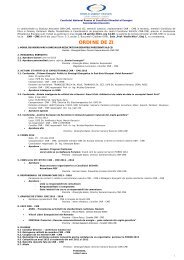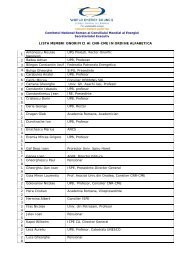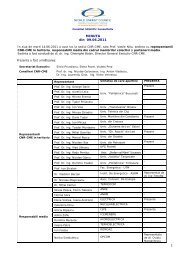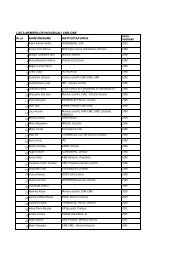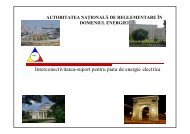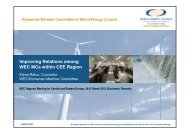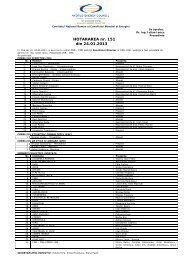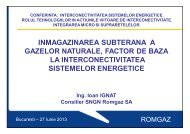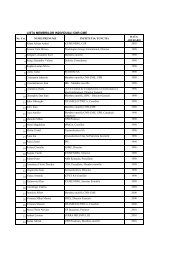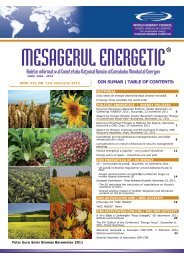Create successful ePaper yourself
Turn your PDF publications into a flip-book with our unique Google optimized e-Paper software.
M E S A G E R U L E N E R G E T I C<br />
outco<strong>me</strong>s, and should have an exit<br />
strategy where possible.<br />
The report also suggests that to encourage<br />
innovation and R&D, policymakers must<br />
leave it to the market to decide the<br />
winning technologies.<br />
Intellectual property rights must be<br />
strongly enforced to incentivise the private<br />
sector to invest in cleaner and more<br />
energy-efficient technologies.<br />
The World Energy Trilemma report also includes<br />
the 2012 Energy Sustainability<br />
Index, a global ranking of countries based<br />
on their performance on the three aspects<br />
of the trilemma.<br />
The Index finds that most countries still<br />
have not managed to balance the energy<br />
trilemma.<br />
It reveals that:<br />
•Environ<strong>me</strong>ntal impact mitigation remains<br />
a universal problem;<br />
•Providing highquality and affordable<br />
energy access remains a significant<br />
challenge for developing and e<strong>me</strong>rging<br />
economies; and<br />
•Countries at various stages of<br />
develop<strong>me</strong>nt struggle with energy<br />
security.<br />
The top 10 performing countries in the<br />
WEC index are Sweden, Switzerland,<br />
Canada, Norway, Finland, New Zealand,<br />
Denmark, Japan, France and Austria,<br />
respectively. n<br />
15–31 December 2012<br />
Inside Insight<br />
Social equity: Africa’s weakest trilemma di<strong>me</strong>nsion<br />
Sub-Saharan Africa is well endowed<br />
both with fossil fuels such as oil, gas<br />
and coal, and renewable resources<br />
including hydro-power and<br />
geothermal.<br />
However, most of this potential<br />
remains untapped as countries face<br />
institutional and infrastructural<br />
barriers to make efficient use of it.<br />
In the WEC’s 2012 Energy<br />
Sustainability Index, countries in Sub-<br />
Saharan Africa score low in<br />
environ<strong>me</strong>ntal impact mitigation,<br />
exhibiting high pollution of air and<br />
water.<br />
The region has very low energy and<br />
emissions intensity per capita, as only<br />
31% of the population currently has<br />
access to electricity. Social equity is<br />
therefore Sub-Saharan Africa’s<br />
weakest di<strong>me</strong>nsion. Overall, reliability<br />
of electricity supply remains a huge<br />
challenge and power outages are<br />
frequent.<br />
The region’s limited ability to improve<br />
its energy system and related<br />
services has significant repercussions<br />
on its social and economic<br />
develop<strong>me</strong>nt, including poor quality<br />
of life and low standards in health,<br />
education and economic<br />
competitiveness.<br />
While environ<strong>me</strong>ntal and social equity<br />
performance varies across countries,<br />
it is notable that no country scores<br />
very well in either di<strong>me</strong>nsion.<br />
Energy sustainability balance of Sub-Saharan Africa. From the 2012 World Energy Trilemma<br />
report.<br />
So<strong>me</strong> countries, mostly the oilexporting<br />
ones, have strong energy<br />
security; however the average<br />
performance remains <strong>me</strong>diocre.<br />
This is primarily due to a positive 5-<br />
year energy consumption growth<br />
trend, which is necessary for<br />
expanding energy services.<br />
The region achieves a relatively good<br />
ratio of production to total energy<br />
supply; however with increasing<br />
economic and industrial develop<strong>me</strong>nt<br />
and rising demands, generation<br />
capacity and infrastructure will have<br />
to expand.<br />
Africa Energy Indaba (18–21<br />
February 2013, Johannesburg) will<br />
offer a platform for discussing the<br />
critical energy issues affecting Africa.<br />
The event will include the WEC’s<br />
annual African regional <strong>me</strong>eting.<br />
More on: www.energyindaba.co.za n<br />
<strong>ian</strong>uarie 2013 35



